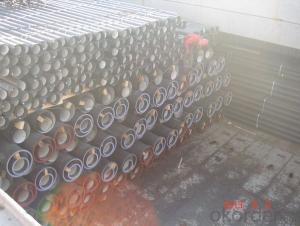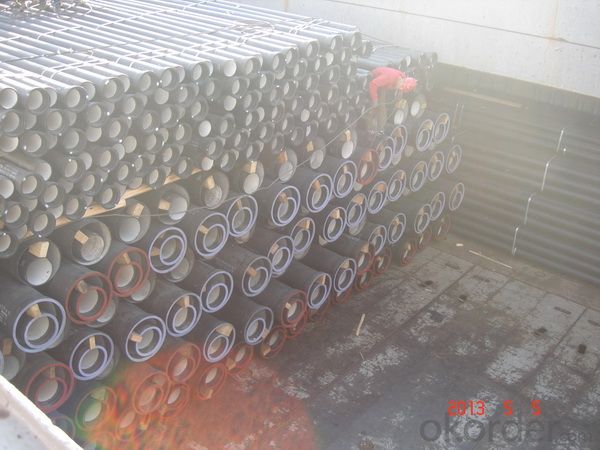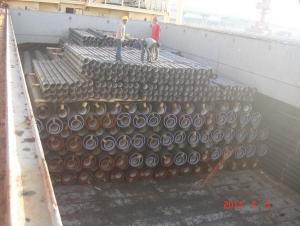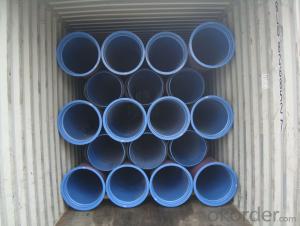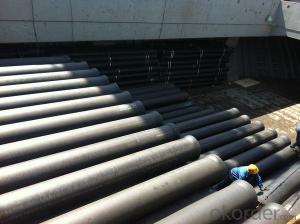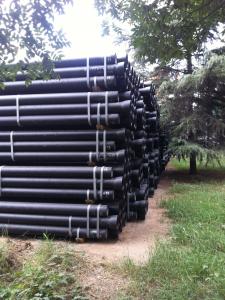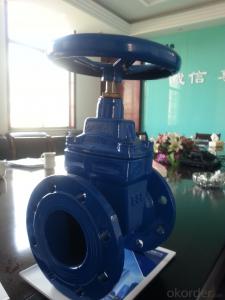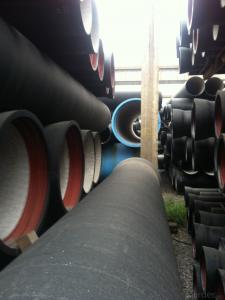DUCTILE IRON PIPES AND PIPE FITTINGS K8CLASS DN100
- Loading Port:
- Tianjin
- Payment Terms:
- TT OR LC
- Min Order Qty:
- 22 pc
- Supply Capability:
- 3000 pc/month
OKorder Service Pledge
OKorder Financial Service
You Might Also Like
Material : Ductile Cast Iron
Size Range : DN 80mm to DN 2000mm
Unit Effective Length : 6m or 5.7m
Manufacture Standard: ISO 2531:1998/ EN 545:2006/EN 598:2007
Annual capacity : 200,000 tons
Coating Exterior: Zinc 130g/m2 according to ISO 8179-1 and bitumen coating 70 microns.
Cement Interior: Portland Cement/ High Alumina Cement/ Sulphate Resisting Cement Lining according to ISO 4179
Special requirements on external coating and internal lining can be applied
We also provide accessories such as SBR/EPDM rubber gaskets, lubricant paste, pipe caps, PE sleeves, etc.
Additional Parts:
Each pipe is strictly inspected according to related standard to ensure permanently high performance.
Easy Installation at site and service free for life
Long Service Lifespan
Quotation will arrive you within 24hours once we get your inquiry.
We guarantee offering you a competitive price.
A copy of original inspection reports of pipes will be offered after shipment.
Photos of loading process will be sent to the customer after shipment effect.
We will follow-up the delivery progress after shipment effect and update to the customer on weekly basis.
- Q: What is the maximum pressure rating for ductile iron pipe?
- Several factors, including pipe diameter, wall thickness, and joint type, typically determine the maximum pressure rating for ductile iron pipe. Generally, manufacturers produce ductile iron pipe capable of withstanding a pressure rating of 350 psi or more. However, it is crucial to consult the specific manufacturer's specifications and guidelines to ascertain the precise maximum pressure rating for a specific ductile iron pipe.
- Q: How are ductile iron pipes protected against mechanical damage?
- Ductile iron pipes are protected against mechanical damage through various measures. One common method is the application of protective coatings on the external surface of the pipe. These coatings, such as epoxy or polyethylene, provide a barrier against abrasion and impact, reducing the risk of mechanical damage. Additionally, ductile iron pipes are often installed with proper bedding and backfill materials, ensuring a stable and supportive environment that minimizes the potential for external forces to cause damage. Furthermore, the pipes can be designed with thicker walls or ribs to enhance their resistance to mechanical stress. Overall, a combination of protective coatings, appropriate installation techniques, and structural design considerations helps safeguard ductile iron pipes against mechanical damage.
- Q: Are ductile iron pipes suitable for industrial water systems?
- Ductile iron pipes, well-known for their strength, durability, and resistance to corrosion, are a perfect choice for industrial water systems. With the capability to withstand high-pressure and heavy-duty applications, these pipes are ideal for transporting water in large-scale industrial facilities like power plants, factories, and chemical plants. Moreover, ductile iron pipes can handle a broad range of temperatures, making them suitable for both hot and cold water systems. Their inherent flexibility allows for easy installation and maintenance, enhancing their suitability for industrial water systems. In conclusion, ductile iron pipes offer a dependable and economical solution for industrial water transportation requirements.
- Q: Can ductile iron pipe be used for underground fire protection systems?
- Yes, ductile iron pipe can be used for underground fire protection systems. Ductile iron is known for its strength, durability, and corrosion resistance, making it a suitable material for such applications. It can withstand high pressures and temperatures, ensuring reliable and long-lasting performance in underground fire protection systems.
- Q: How to control mortar proportioning in ductile iron pipe cement coating
- The calculation steps are: first to calculate the amount of plastering engineering (area), and then check the "national construction basic quota" quota in the corresponding amount of mortar project, engineering quantity multiplied by the amount of mortar that fixed amount of mortar, the mortar amount multiplied by the corresponding mix ratio of mortar, the consumption of raw materials can be obtained.
- Q: How to correctly measure ductile iron pipe
- The outer diameter of the ball tube is measured around the outer edge of the pipe. The caliper is used to measure the inside diameter of the pipe. The length of the pipe is measured by a ruler or tape measure,
- Q: Can ductile iron pipe be used for oil and gas transmission pipelines?
- Yes, ductile iron pipe can be used for oil and gas transmission pipelines. It offers excellent strength, durability, and corrosion resistance, making it suitable for the transportation of various fluids, including oil and gas. However, other factors such as specific project requirements, operating conditions, and regulatory standards should also be considered before making a final decision.
- Q: Are ductile iron pipes suitable for sewage treatment plants?
- Ductile iron pipes, without a doubt, prove to be an appropriate choice for sewage treatment plants. The material itself, known for its strength and durability, can endure the challenging conditions commonly encountered in such facilities. It boasts high tensile strength and exceptional resistance to corrosion, safeguarding it against the destructive influence of sewage and various chemicals present in wastewater. Furthermore, the smooth interior surface of ductile iron pipes facilitates the efficient flow of wastewater, thus minimizing the likelihood of clogs or blockages. Their installation and maintenance procedures are also hassle-free, rendering them a cost-effective alternative for sewage treatment plants. When it comes down to it, ductile iron pipes emerge as a dependable and enduring solution for the transportation of sewage within these establishments.
- Q: Can ductile iron pipe be used for water distribution systems in cold climates?
- Yes, ductile iron pipe can be used for water distribution systems in cold climates. Ductile iron has excellent resistance to freezing and can withstand extreme cold temperatures without becoming brittle or cracking, making it a suitable choice for water distribution systems in cold climates.
- Q: What is the weight of a typical ductile iron pipe?
- The weight of a typical ductile iron pipe can vary depending on size and wall thickness. Ductile iron pipes are generally available in sizes ranging from 3 inches to 64 inches in diameter. The weight of these pipes can range from a few pounds per foot for smaller sizes to several hundred pounds per foot for larger diameters. Additionally, wall thickness plays a significant role in determining the weight of the pipe. Thicker walls will result in a heavier pipe. For example, a 10-inch ductile iron pipe with a wall thickness of 0.25 inches may weigh around 26 pounds per foot, while a 24-inch ductile iron pipe with a wall thickness of 0.5 inches can weigh approximately 175 pounds per foot. To determine the precise weight of a specific ductile iron pipe, it is essential to consult specific manufacturer specifications or engineering references.
Send your message to us
DUCTILE IRON PIPES AND PIPE FITTINGS K8CLASS DN100
- Loading Port:
- Tianjin
- Payment Terms:
- TT OR LC
- Min Order Qty:
- 22 pc
- Supply Capability:
- 3000 pc/month
OKorder Service Pledge
OKorder Financial Service
Similar products
Hot products
Hot Searches
Related keywords
